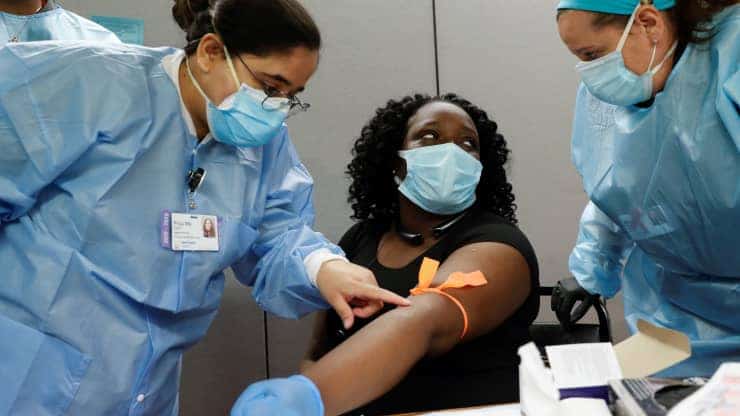
Shannon Stapleton | Reuters
“Long COVID” — the name given to ongoing symptoms that millions have reported suffering after a COVID-19 infection — is here to “haunt us for a while yet,” according to a scientist studying the impact of the condition. But there are hopes that a diagnostic test could soon be developed.
The symptoms of long COVID vary but can include ongoing fatigue, shortness of breath, memory loss or problems with concentration (dubbed “brain fog”), insomnia, chest pain or dizziness. However, it remains a poorly understood condition and scientists don’t yet know why some people continue to have some symptoms post-COVID, but others don’t.
Data collected in one British study recently suggested that millions of people could be affected by long COVID following a coronavirus infection. To date, over 187 million cases of COVID have been recorded around the world. Given that number, the potential quantity of people that could be affected by long COVID is significant.
Danny Altmann, professor of Immunology at Imperial College London, told CNBC on Tuesday that “the data (on long COVID) are coming through thick and fast and what it says that, of the 170 million people plus on the planet that have been infected with this virus, that 10%-20% of them will have long-term persistent symptoms.”
“What you see is people that have wheezing or breathlessness and fatigue and brain fog and that long list of about 50 symptoms. So it really is a thing and it’s a thing that is to haunt us for a while yet. It’s a price that we have to pay and we have to look at in terms of people’s lives and jobs and healthcare provision for them,” he told CNBC’s Squawk Box Europe.
Altmann noted that data on long COVID was “very reproducible across the planet whether you look in China or Bangladesh or France or the USA.”
Potential causes of long COVID being considered by scientists include organ damage caused by COVID infection, problems with the immune system following an infection or a reactivation of the virus; or perhaps a combination of factors.
One British study, published last October, identified the main factors that make it more likely that patients will suffer long term from the coronavirus, with one’s age, weight and gender among them. But further research is prompting hopes that there could soon be a test to diagnose the little-understood but often life-altering condition.
Tests for long COVID?
Imperial College’s Altmann is part of a team investigating long COVID, analyzing blood samples of those who have it in an effort to discover the cause.
Previewing their early findings on the BBC’s Panorama program Monday evening, the team said they had found that irregular antibodies were common in blood samples of people suffering with long COVID.
Normally, the immune system mounts a protective response by creating antibodies to fight a virus, but sometimes this goes wrong and “autoantibodies” — sometimes described as “rogue antibodies” — are produced that attack healthy cells.
Researchers led by Altmann found that such autoantibodies were common in people with long COVID, although only a small number of blood samples were analyzed in the pilot study. Autoantibodies were not found in comparative blood samples of people who had recovered quickly from the virus or had never tested positive for COVID-19, however.
Still, the finding of such irregular antibodies in those with long COVID could lead the way for a simple diagnostic test in which a person’s blood is analysed. If autoantibodies are found, long COVID could potentially be diagnosed; and this, in turn, could help inform treatment and recovery plans for patients.
Speaking to the BBC, Altmann said the findings cannot yet be described as a breakthrough, but that they were “a very exciting advancement.”
“One of the things we know for absolute certain is that long COVID can ensue from any kind of infection: asymptomatic, mild or severe,” he told Panorama.
“The pilot data that we have says that you really can pick up different patterns of autoimmunity in people who have long COVID,” he said. While more research needs to be done, Altmann said he was optimistic that there could be a simple blood test available that can diagnose long COVID within 6 months.

